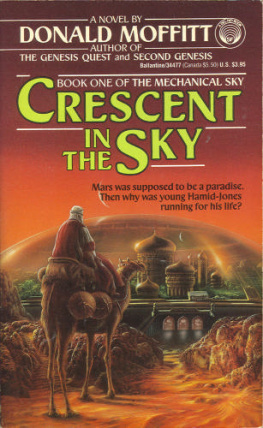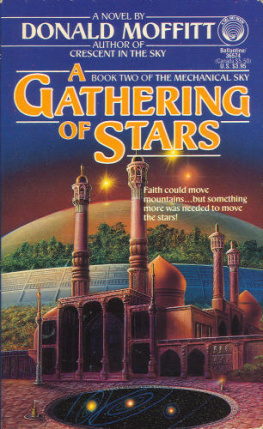Donald Moffitt - Crescent in the Sky (The Mechanical Sky, Book 1)
Here you can read online Donald Moffitt - Crescent in the Sky (The Mechanical Sky, Book 1) full text of the book (entire story) in english for free. Download pdf and epub, get meaning, cover and reviews about this ebook. year: 1989, publisher: Del Rey, genre: Detective and thriller. Description of the work, (preface) as well as reviews are available. Best literature library LitArk.com created for fans of good reading and offers a wide selection of genres:
Romance novel
Science fiction
Adventure
Detective
Science
History
Home and family
Prose
Art
Politics
Computer
Non-fiction
Religion
Business
Children
Humor
Choose a favorite category and find really read worthwhile books. Enjoy immersion in the world of imagination, feel the emotions of the characters or learn something new for yourself, make an fascinating discovery.
- Book:Crescent in the Sky (The Mechanical Sky, Book 1)
- Author:
- Publisher:Del Rey
- Genre:
- Year:1989
- Rating:3 / 5
- Favourites:Add to favourites
- Your mark:
- 60
- 1
- 2
- 3
- 4
- 5
Crescent in the Sky (The Mechanical Sky, Book 1): summary, description and annotation
We offer to read an annotation, description, summary or preface (depends on what the author of the book "Crescent in the Sky (The Mechanical Sky, Book 1)" wrote himself). If you haven't found the necessary information about the book — write in the comments, we will try to find it.
Crescent in the Sky (The Mechanical Sky, Book 1) — read online for free the complete book (whole text) full work
Below is the text of the book, divided by pages. System saving the place of the last page read, allows you to conveniently read the book "Crescent in the Sky (The Mechanical Sky, Book 1)" online for free, without having to search again every time where you left off. Put a bookmark, and you can go to the page where you finished reading at any time.
Font size:
Interval:
Bookmark:
CRESCENT IN THE SKY
Book One of The Mechanical Sky
Donald Moffitt
Copyright 1989 by Donald Moffitt
Library of congress Catalog Card Number: 89-91802
ISBN 0-345-34477-4
Cover Art by Don Dixon e-book ver. 1.0
"We have pried into the sky, but found it filled with strong guards and meteors. " the koran, sura 72: The Djinn II
CHAPTER 1
T he call to prayer sounded from his wrist monitor, and Abdul Hamid-Jones reluctantly pressed the hold button on the haft of his micromanipulator remote and set it down carefully on the laboratory bench. With a martyr's sigh, he consulted the glowing 3-D arrow that seemed to be floating somewhere within his wrist on the little holographic display.
It was a little complicated this afternoon. Mecca was located somewhere underfoot, through the entire bulk of Mars, with an ambiguous east-west orientation, and moreover, since that face of the Earth happened to be turned away at the moment, it was upside-down in Hamid-Jones's frame of reference.
He cast a last despairing glance at the magnified events unfolding on the big bench-mounted screen. The restriction enzymes had done their work, but DNA was leaking all over the place, and if he didn't do something about annealing the loose ends immediately, the carefully prepared plasmid chimera waiting in the wings would be spoiled. He was almost tempted to skip the afternoon devotion, but the door to his cubicle was open, and the overseer, Yezid the Proda man of limited understandinghad been on the prowl all day.
The insect buzz of the muezzin's voice grew more insistent at his wrist. " Allahu akbar, Allahu akbar!' ' it repeated for the last time; "La ilaha ilia Allah!" With a muttered "All right," Hamid-Jones drew the monofilm prayer rug out of his shirt pocket and unfolded it to full size. He flexed his wrist a couple of times, making sure that the arrow held steady, then hastily made his silent declaration of intentionthough somewhat guiltily limiting himself to the minimum number of rak'as.
"Allahu akbar, " he responded with not a moment to spare and sank to his knees in the light Martian gravity, prostrating himself in the direction that, according to the astronomical computer's tiny brain, most nearly approximated that of Mecca.
Halfway through his specified rak'as, he felt a shadow fall across his back. He knew without looking that it was Yezid and was awfully glad that he had not given in to the impulse to evade his religious duties. Yezid had been more foul-tempered than usual of late. Only a few days ago he had had an unfortunate Callistan slave flogged for a minor infraction of department regulations. Not that Hamid-Jones himself was in danger of such treatment; Yezid would hardly dare to touch an assistant to the Clonemaster of the Royal Stables. But it would be deucedly embarrassing to be hauled in front of a religious court and scolded, and it might hinder his advancement.
The shadow went away. Hamid-Jones finished his prayers and scrambled to his feet. He left the rug where it was; his first thought was for the bright twisting shapes of the gene assembly displayed above the lab bench.
He gave a groan. It was ruined. Even from the pseudoimage with its computer-assigned colors, he could see that it was a hopeless tangle. The passenger gene had come unstuck and attached itself to a section of an inverted repeat sequence on the wrong strand of the heteroduplex he had created that morning.
He shuddered to think of the consequences if a clone with a hidden defect ever were allowed to come to foal. He was working with genetic material from the Emir's prize stallion. The Emir tended to take a personal interest in the offspring of his beloved al-Janah, the Winged One.
Knowing that it was hopeless, he punched up the magnification and called for a schema to confirm the bad news. The computer obliged with a color-coded abstraction that showed the sequencing of base pairs on the offending palindrome as a series of little plugs and sockets. The replication fork was busily zipping itself up to the end of the moleculea repeat structure gone wild.
Hamid-Jones flushed it all away. He was going to have to do it all over again, from scratch. Wearily he began assembling the components of another plasmid from the DNA fragments he had in storage.
"Ya Abdul, why so serious?" a voice said from the door. "Coming to tea?"
Hamid-Jones looked around. It was Rashid, from the protein assembly section. Like himself, Rashid was descended from mawali, or "client" forebears, and it showed in Rashid's sandy hair and boiled complexion. Hamid-Jones, on the other hand, might almost have passed for a pure-blooded ethnic Arabwith his hawklike visage, deeper coloring, and fierce dark eyesbut he was painfully aware of his origins. Like it or not, he was an Anglo-Arabforever to be known in the social scheme of things as an 'arab al masta ariba, "one who becomes an Arab." He was not as low on the social scale as the ubiquitous dhimmi, or unbelieverswho nevertheless enjoyed perfect tolerance as long as they paid the jizza, or head tax, of the unconvertedbut he would never achieve the status of a true Arab of tribal descent, an 'arab al' ariba. He would always have to work harder to get ahead.
"No, I'll skip tea today," he told Rashid somewhat brusquely. "I want to finish this."
He bent over the workbench again, a rather ordinary young man in cheap shirt and trousers, with a headcloth that was carelessly askew. Hamid-Jones's six feet two inches would have been considered tall on Earth, but he had already completed half his growth when his parents had emigrated to the Martian Emirate, and as a consequence he was a head shorter than most of his Marsborn co-workers, and had heavier bones and musculature. Strength, he had often had cause to notice, was not as important in the world as height; it was eye level that counted. There was still a trace of the British Protectorate in his Arabic accent another factor setting him apart.
Rashid did not go away, as Hamid-Jones had hoped. He lingered in the doorway, his eyes straying alertly to the screen. "Let it go, whatever it is," he said. "It can't be that important.''
Hamid-Jones reached up and switched to a muon-scope view in uninformative shades of gray. He went on working without replying. After a moment, Rashid tried again.
"Who's it for?" he asked slyly. "Not a falcon or saluki for someone in the palace, is it? That would be a terrific plum."
"It's a horse," Hamid-Jones said unwillingly.
"Ah, a horse. Very nice." Rashid's oily gaze shifted to the sealed cryocontainer that Hamid-Jones had neglected to stow out of sight. "I'm giving it a third lung, like that mutation that cropped up in the Horse Guard stables." Rashid pounced immediately. "Ah... but you're working with sequestered material, I see. That means ..
Hamid-Jones clammed up. "You'd better get going if you don't want to miss the tea break."
"As you like," Rashid said with a shrug. " Ma'al salaama. " He left, the envy plain in his eyes.
Hamid-Jones set doggedly to work once more. Rashid would be spreading gossip in the canteen, but there was nothing he could do about it. The assignment was a plum, and he had no intention of shirking it. The Clonemaster, the esteemed Hassan bin Fahd al-Hejjaj, was grooming him for higher thingsthere was no doubt about it. There had been other tests before this one.
It was a great opportunity, but not without its perils. One of Hamid-Jones's predecessors in the job had come to the Emir's personal attentionunfavorablyand the story was still told in whispers of how he had been fed alive to the Royal Aviary. Of course the circumstances were hardly comparable; the unfortunate cloning assistant had been guilty not of mere failure, but of stealing sequestered genetic material and selling it to members of the minor aristocracy anxious to improve the breeding of their hunting dogs. But salukisthe Noble Oneswere a royal prerogative. They could never be sold, only exchanged or given as giftsand that went for their DNA, too. Still, stealing genetic material of treasured animals was a time-honored custom, and it was usually the servants who were caught. Even in the time of the Prophet more than two millennia before, enterprising desert sheiks had schemed to purloin the semen of prize stallions and race it across the sands to waiting mares. That was how the Arabian breed had spread. Nowadays it was done by contraband nucleotides.
Font size:
Interval:
Bookmark:
Similar books «Crescent in the Sky (The Mechanical Sky, Book 1)»
Look at similar books to Crescent in the Sky (The Mechanical Sky, Book 1). We have selected literature similar in name and meaning in the hope of providing readers with more options to find new, interesting, not yet read works.
Discussion, reviews of the book Crescent in the Sky (The Mechanical Sky, Book 1) and just readers' own opinions. Leave your comments, write what you think about the work, its meaning or the main characters. Specify what exactly you liked and what you didn't like, and why you think so.











